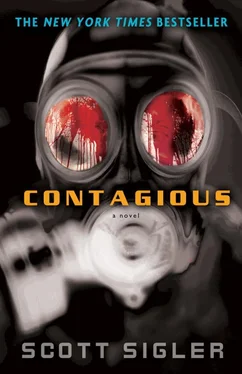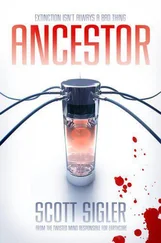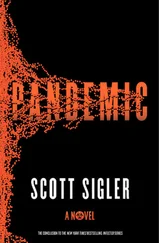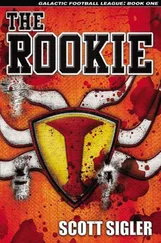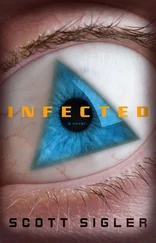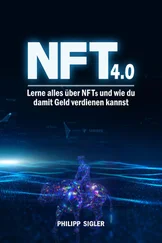“Okay,” Perry said.
“When you knocked out Baum and Milner, you didn’t take their guns.
Why?”
“I didn’t need them.”
“Bullshit,” Dew said. “You were going in there to kill those infected people. As far as you knew, they were dues-paying members of the NRA. Maybe you wouldn’t mind getting killed, but I know your kind—the game was on, and you wanted to stop a gate from opening up. You didn’t want to lose. Am I right?”
Perry looked at the floor, blond hair hanging. “I want to stop them more than anything,” he said quietly. “They’ve taken so much from me, but I… at least I can still win. If they can’t do what they were sent to do, junk or no junk, well then, guess what? I win. Fuck them, I win. ”
Dew nodded. “I know what you’re saying. I want to stop these little fuckers like you have no idea. But you didn’t take the gun, which means you left a way for them to beat you. Why? ”
Perry sat still and quiet. Dew just waited. Sometimes you get more done with silence than with all the words in the world.
“You’re going to think I’m crazy,” Perry said.
“I already think you’re more batshit than a padded room full of Charlie Mansons. So out with it.”
“I… I still hear Bill.”
Dew hadn’t expected that. This was one messed-up camper.
“You mean, like you heard your dad? Back when you were infected?”
Perry nodded. “Yeah, kind of like that. Bill keeps telling me to shoot myself.”
“Shoot yourself.”
“Uh-huh. So I don’t want to pick up a gun, ’cause… ’cause maybe I want to listen to him.”
“If you really want to kill yourself, you don’t need a gun.”
Perry looked up. “Yeah, but the other ways, they take at least a little preparation. Some time to think. Maybe you come to your senses. But a gun? You go from thinking about it to pointing it, pulling the trigger in what, like two seconds?”
Dew nodded. He’d planned on doing just that if he found strange, itchy lumps on his own skin. Wasn’t eating a bullet better than enduring Perry’s ordeal?
“Yeah,” Dew said. “Two seconds, if even that.”
“So that’s why I didn’t touch their guns.”
He was no psychologist, but even so drunk he could barely stand, Dew Phillips still had all the common sense his mama had given him. Perry had suicidal thoughts but was cognizant enough to stay away from something that could instantly make those thoughts a reality.
“Dawsey, have you ever shot a gun?”
Perry shook his head.
“Get some sleep. Your life is what it is. Tomorrow we’re going to stop letting you feel sorry for yourself.”
THIS IS YOUR BRAIN ON CRAWLERS
Chelsea Jewell woke up. She wiped a mist of sweat from her face, then got out of bed. She grabbed her pillow and dragged the comforter off the mattress.
Mommy might come in when she slept. She might come in and punish her. Chelsea had to hide.
She opened the closet’s folding doors and pulled out all of her shoes. She put those under the bed, then lugged her pillow and blanket inside. She shut the closet door, then lay down, head on the pillow, body on top of the comforter, and fell asleep even before she could cover up.
Inside Chelsea’s head 1,715 crawlers were waiting at the base of her skull. As a unit, they released enkephalins and endomorphins into the blood pouring through her brain. These powerful natural opiates spread through her brain, locking onto opioid receptors and stopping them from receiving any information—in particular, messages of pain.
Which, considering what was about to happen, might have been the only humane thing the crawlers would ever do.
The crawlers surged upward, expanding through her frontal lobe like a gas. Once dispersed, they un bundled, turning back into individual hacked muscle fibers ready to rebind in new ways with entirely new functions.
The “I am here” signals began again, but this time the fibers latched onto each other end to end, forming long strands. These strands crossed over each other on all axes, X and Y and Z and everything in between, creating a ropy mesh that ran through her frontal lobe, her parietal lobe, her hippocampus and, in particular, her orbifrontal lobe. In many places fibers formed dendritelike fingers that connected to Chelsea’s brain cells on one end and to the mesh on the other.
In just a few hours, 1,715 crawlers morphed into a neural net lacing through the parts of Chelsea’s brain that controlled higher functions. Functions like memory. Thought. Reason. Abstraction. Emotion.
Finally, the remaining fibers wiggled and converged at the center of Chelsea’s brain. If you could have seen in there, you would have sworn they were attacking each other, ripping each other to pieces. But the fibers weren’t alive, and they weren’t individuals; they were part of a larger function. They weren’t tearing each other apart; they were rearranging, rebuilding… melding.
When they finished, they formed a ball some one thousand microns in diameter. Tendrils reached out from this ball, connecting with the neural net of converted crawlers. Once those connections were made, the ball did what it was designed to do.
It sent a signal.
REACH OUT AND TOUCH SOMEONE
The Orbital had monitored early biofeedback from the new strain. Based on initially high levels of apoptosis, the Orbital had logically assumed that this batch of crawler-building seeds was a total failure. The growing workers would once again have to fend for themselves, try to avoid the sonofabitch as they built a gate.
The Orbital was already working on creating a second crawler-building batch with a modified code. This would be the last chance, the eighteenth and final probe.
When it received the signal, however, it abandoned the modified code. It focused all processing power on the new situation.
This signal, this lone signal, meant potential success. It provided a direct point of entry. And if the Orbital could communicate clearly enough, gather enough information, send enough reprogramming code back down the signal chain, then that lone signal meant a vector.
The Orbital sent a signal of its own and started gathering information.
“Daddy, wake up.”
Donald’s mind swam in a sea of subdued pain. His body burned. Every inch seemed to be deep-fried, and his left hand felt even worse than that.
“Daddy, wake up !”
He didn’t want to wake up. When he was asleep, he didn’t have to feel it.
“Daddy, mah face! Mah face !”
The voice finally hit home, as did the hysterical urgency of Betty’s words. She was mispronouncing things, as if she had food in her mouth. He blinked awake, hissing in a sharp breath as the pain continued to wash over his body. A cough caught the tail end of that breath, then ripped out, dragging barbed wire through his lungs, his throat, smashing his eyes shut as liquid burned his mouth. He’d coughed so hard he’d thrown up.
“Daddy! Omahgod!”
Donald pulled his right hand out from under the sleeping bag, put it on the steering wheel and eased himself back. The steering wheel felt hot and wet from his vomit. He didn’t want to move his other hand—it burned too much—so he left it under the blanket. He opened his eyes.
And found that it wasn’t vomit at all.
Blood covered the steering wheel. Blood, and bits of something black.
“Daddy, are you okay? You’re coughing up blood!”
Donald blinked, trying to get his bearings. He hurt so bad. His body burned. His daughter screaming right in his fucking ear. He had to calm her down. Donald turned to look at her and flinched when he saw her face. Three oozing black sores clung to her left cheek. For a second, he thought how nothing could be worse to a teenage girl than something messed up on her face. Only for a second, though, because through the haze Donny realized that this wasn’t some monster pimple—there was something very wrong with his baby girl. He had to get her to a hospital.
Читать дальше
